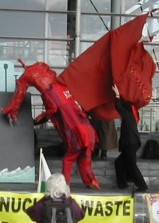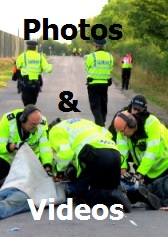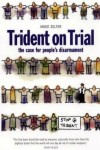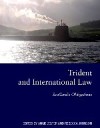
At the first ever high-level meeting on nuclear disarmamentlast week, a resounding call for banning and eliminating nuclear weapons was made. The advocacy work by ICAN campaigners in the past weeks resulted in a growing recognition of the humanitarian impact of nuclear weapons.
In an effort to regain some control over the discourse, a few nuclear-armed states– the United States, France and the United Kingdom – tried to dismiss new initiatives like the Oslo conference, the Mexico follow-up conference and the Open-ended working group on nuclear disarmament, but their disingenuous concerns about “distractions” and “existing forums” failed to convince.
Instead, their words have the opposite effect. Their visible discomfort with the discussion on the humanitarian impact only makes it clearer that this is the way forward. The “humanitarian campaign” – as they called the efforts to develop an evidence-based discussion on the humanitarian impact of nuclear weapons – contains a framing that nuclear-armed states cannot control or constrain; it is a discussion where humanitarian principles take precedent over security doctrines and strategic deterrence theory. It’s a discussion that ultimately will force everyone to make a decision, are these weapons acceptable or not?
The resistance from nuclear-armed states is a sign that we’re on the right track. And the “humanitarian campaign” does not appear to be slowing down anytime soon, despite the grouchy moaning of the nuclear-armed states.
Quite the contrary, over 125 states highlighted concerns for the humanitarian impact of nuclear weapons. The Mexican Foreign Minister invited all states to attend a second meeting on the humanitarian consequences of nuclear weapons, to be convened on 13- 14 February in Nayarit on the country’s Pacific coast.
Civil society presented its demand to the governments of the world: we expect them to ban and eliminate nuclear weapons. If you haven’t watched ICAN’s Nosizwe Baqwa deliver a message from civil society to the high-level meeting yet, you need to do so now. Her powerful statement reminded us all that a treaty banning nuclear weapons is achievable, and that it can be initiated by states that do not possess nuclear weapons.
Nosizwe’s statement highlighted that such treaty will require courage and that it will take leadership by non-nuclear weapon states. But it is possible. It is achievable. And civil society will put all our support behind those that take the lead.
We are ready to ban nuclear weapons. Are you?


Interview with Network Coordinator Magnus Løvold
Q: During 2013 the resonance of the humanitarian consequences of nuclear weapons has increased. More and more countries are recognising humanitarian disarmament as an approach worth exploring. What has been the role of ICAN’s campaigners in raising awareness among states?
A: Since the catastrophic humanitarian impact of nuclear weapons was first mentioned at the 2010 Review Conference of the Nuclear Non-Proliferation Treaty (NPT), the humanitarian approach has made real headway in the international nuclear weapons debate. Over the last years, ICAN campaigners from all around the world have worked hard to make their governments open their eyes to the humanitarian impact of nuclear weapons, and 2013 has been the year when we start seeing the results. 128 states turned up at the Oslo conference, and at the Preparatory Committee of the NPT, 80 states supported a statement on the humanitarian impact of nuclear weapons - up from a mere 16 the year before. It is clear that without the actions carried out by civil society in partnership with leading states, we would probably not have seen such a rapid increase in the number of states supporting these statements.
Q: Can we call the High-Level Meeting on nuclear disarmament a success and why?
A: The High-Level Meeting shows that the humanitarian approach is the game changer we thought it would be, and that is has the potential to bring about real and tangible progress towards nuclear disarmament. Partly because of the actions carried out by ICAN’s partner organisations and campaigners in the run-up to this meeting, the humanitarian impact of nuclear weapons became one of the dominant themes during this meeting. A high number of states from all global regions also drew the logical conclusion stemming from this approach, and called for the start of negotiations on a new legal instrument prohibiting nuclear weapons.
Q: The United States, the United Kingdom and France called the focus on the humanitarian consequences a distraction. Is it really a distraction or is it the core reason why we should disarm?
A: It is not very surprising to see how some of the nuclear-armed states are trying to portray the renewed focus on the humanitarian impact of nuclear weapons as a distraction, although US President Barack Obama himself has expressed concern at the devastating effects of nuclear weapons, and all states, including the nuclear-armed states, have committed themselves to work for world without nuclear weapons. But clearly, the evidence showing exactly how catastrophic the effects of a nuclear detonation would be is a hard pill to swallow for certain nuclear possessing states. Sometimes is can be difficult to face reality, especially if it puts your own behaviour in a less than favourable light. And then it might be easier simply to dismiss the evidence at hand and blame someone else for your own failure to act.
Q: What are the next steps for ICAN now?
A: In the coming months, the Mexico conference on the humanitarian impact of nuclear weapons is on top of our agenda. We are building upon the successful outcome of the Oslo conference, and hope to make some real and tangible progress. More specifically, we will work to make the turnout in Mexico at least as high as in Oslo, and ICAN campaigners will reach out to their governments in the coming months to urge them to participate actively and at the highest possible working level in Mexico. In only three weeks, moreover, ICAN will be present at the First Committee of the United Nations General Assembly in New York to make as many states as possible support a joint statement on the humanitarian impact of nuclear weapons delivered by New Zealand.




















